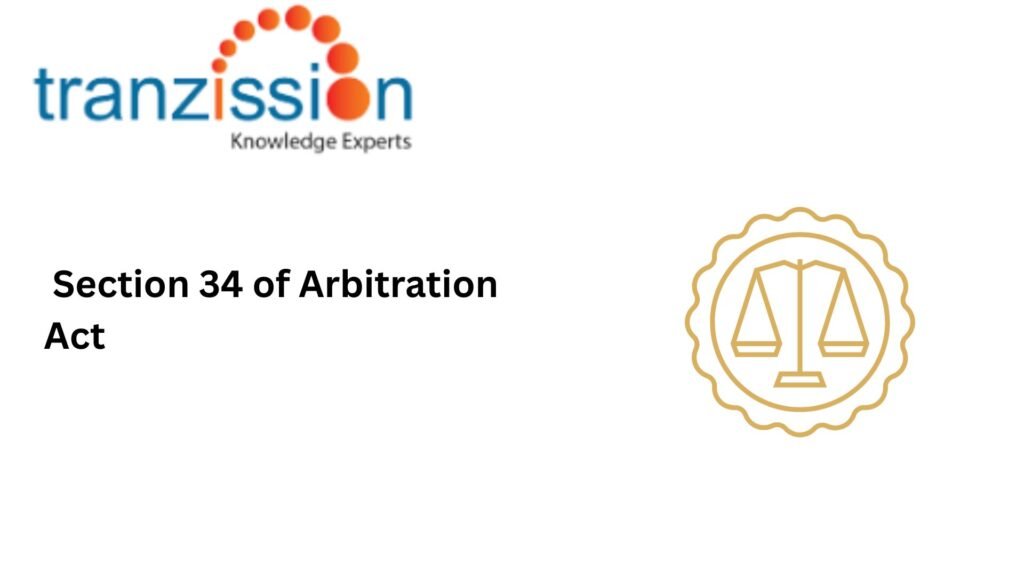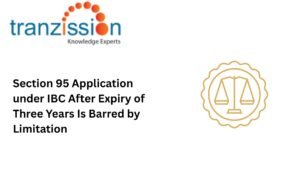
Section 34 of Arbitration Act

Table of Contents
Chapter VII, Section 34 of Arbitration Act and Conciliation Act, 1996 provides the power to parties of arbitration to challenge the final arbitration award. It allows parties to seek judicial intervention to set aside the arbitration award and lays down specific grounds on the basis of which the final award can be set aside. This provision is an exclusive legal remedy for challenging domestic arbitration awards in India.
Statutory Grounds for Setting Aside
Section 34(2) states that an arbitral award may be set aside by the court if:
- The party making the application establishes on the basis of the record of the arbitral tribunal that:
- a party was under some incapacity
- the arbitration agreement is not valid under the law to which the parties have subjected it or, failing any indication thereon, under the law for the time being in force
- the party making the application was not given proper notice of the appointment of an arbitrator or of the arbitral proceedings or was otherwise unable to present his case
- the arbitral award deals with a dispute not contemplated by or not falling within the terms of the submission to arbitration, or it contains decisions on matters beyond the scope of the submission to arbitration
- The court finds that:
- the subject-matter of the dispute is not capable of settlement by arbitration under the law for the time being in force
- the arbitral award is in conflict with the public policy of India, such as the making of the award was induced or affected by fraud or corruption or was in violation of section 75 or section 81, it is contravention with the fundamental policy of Indian law, or is in conflict with the most basic notions of morality or justice.
Patent Illegality as a Standalone Ground
Section 34(2A) of the Act allows courts to set aside in domestic arbitrations if they find the award is vitiated by patent illegality appearing on the face of award. This provision was introduced by the Arbitration Amendment Act of 2015. It also clarifies that an award cannot be set aside merely due to an erroneous application of law or re-appreciation of evidence protecting against court overreach.. “Patent illegality” is a fundamental error of law that is evident on the face of the award, making it invalid, applying only to domestic awards and not international commercial arbitrations.
Procedural Requirements for Section 34 of Arbitration Act
This provision not only lists the reasons for setting aside an award, but also the procedural requirements. A party can apply to the court to aside an award only on specific grounds:
- There is a strict 3-month time limit, which can be extendable by 30 days if the party can demonstrate a valid reason for the challenge.
- The applicant must serve a notice before filing.
- The applicant needs to disposed of expeditiously within a period of 1 year from the date on which the notice is served upon the other party.
Curative Remission to Tribunal
Section 34(4) allows a court to remit an arbitral award back to the tribunal for clarification or to correct curable defects, rather than settling it aside entirety. This provision aims to preserve the award by giving the tribunal a chance to address issues like missing or inadequate reasoning, while preventing the court from substantively modifying the award. The court cannot use this provision to ask the tribunal to revisit findings or conduct a review of the award. It essentially upholds the sanctity of the award by giving the tribunal a chance to address curable defects and avoid setting aside the award entity.
Read more : Understanding Fresh Start Process Under IBC in India
Key Judicial Precedents
In the ONGC vs Saw Pipes, 2003 case the Supreme Court expanded the definition of “public policy” in the context of arbitral awards to include patent illegality, thus broadening the grounds for challenging an award. Further, the court in Associate Builders v DDA significantly narrowed the scope of public policy as a ground for setting aside arbitral awards under section 34. The decision clarified that public policy is limited to cases of fraud, fundamental policy, and basic morality and not mere errors of law or contract interpretation. In the 2019 case, Ssangyong v NHAI & NHAI v Hakeem, the court reaffirmed limited court interference and clarified that courts cannot modify awards.
What Courts Cannot Do
Under Section 34 of Arbitration Act there are limitations to the courts actions:
- The court’s role cannot re-evaluate the evidence presented to the arbitrator, nor can it substitute its own interpretation of the facts or the law.
- Courts can only set aside an award based on specific, limited grounds in this provision, such as patent illegality, public policy violations, or if the tribunal lacked jurisdiction.
Hence, the courts intervention is intended to be minimal, primarily to address serious flaws in the award rather than to re-adjudicate the dispute.
Practical Insights & Anecdotes
In practice, courts primarily examine whether the arbitral process was fair and transparent. For example, if a party can demonstrate they were not given a proper opportunity to present their case, the award may be set aside. While a mere violation of law may not be sufficient to set aside an award, a fundamental breach of public policy, such as an award obtained through fraud, could lead to its invalidation. For instance, if a party missed the deadlines for filing a Section 34 of Arbitration Act application, they may be barred from challenging the award, even on grounds that would otherwise be valid.
Best Practices for Drafting Section 34 Petitions
Professionals, such as advocates or insolvency professionals, to need to ensure certain steps when drafting Section 34 of Arbitration Act petitions:
- It is important to focus on the grounds under Section 34 of Arbitration Act and align each ground with Section 34’s categories.
- They must provide clear evidence, by placing reliance on the award document itself, hearing notices, and procedural records.
- Where defect is procedural and curable, it is necessary for the professionals to request remission under Section 34(4).
Conclusion
Section 34 of Arbitration Act aims to strike a balance between respecting the autonomy of arbitration and allowing courts to intervene in cases of serious errors. It empowers courts to set aside arbitral awards on specific grounds, while also enabling them to remit awards back to the tribunal for correction. This approach ensures that arbitration remains efficient and just limits court intervention to cases of genuine or public policy violation.





